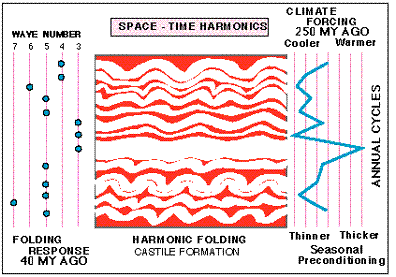
One by one, year by year, the layers accumulated on
the bottom until the water shallowed and the basin was filled with striped
mud. Each season the thickness of a light layer or a dark layer recorded
what kind of a year it was, sunny, cloudy, or average. What seems remarkable
to me is that 200 million years later, as the rock was squeezed and as the
layers rumpled, the kind of year it was, the weather of some previous era,
was noticed once again as each layer offered its own resistance to further
change.
It's no wonder that this artful geometry, exposed in the banks of an arroyo,
caught the attention of those who passed near. And it is no wonder that
the patterns deserve notice. For within the harmonic pattern is an almost
Einsteinian interweaving of space and time. Powerful atmospheric, and oceanic,
and subcrustal forces were at work in making this example of nature's fretting.
Its rhythms, now frozen in space, were orchestrated by the response of fluids
to the earth's tilt and rotation. All these things together give our small
piece of rock its tempo. I can count the number of folds in a layer and
place that number on a musical score sheet. If I were to add flags and a
clef, it could be a musical composition written by the earth.
